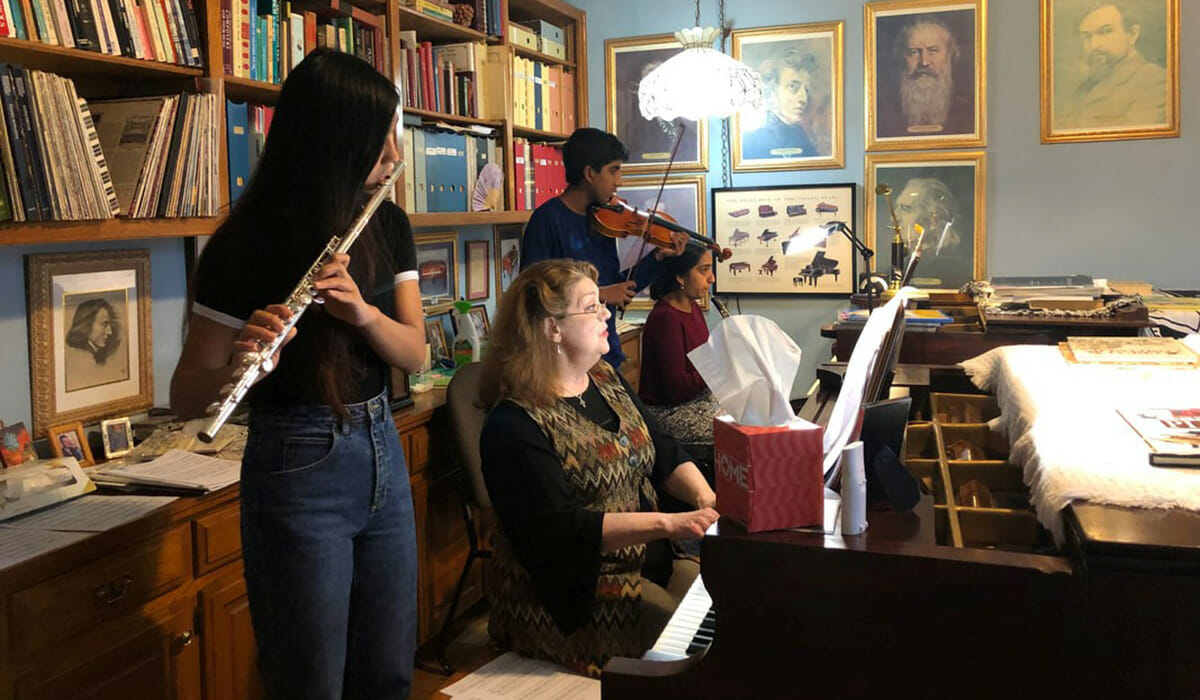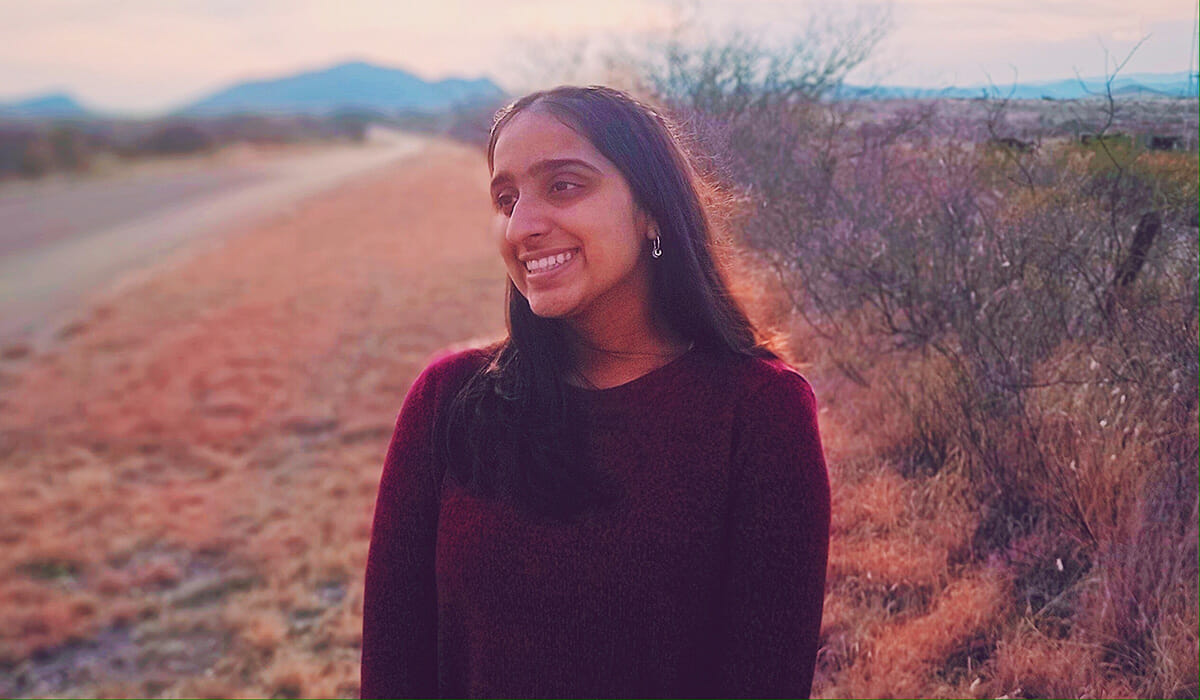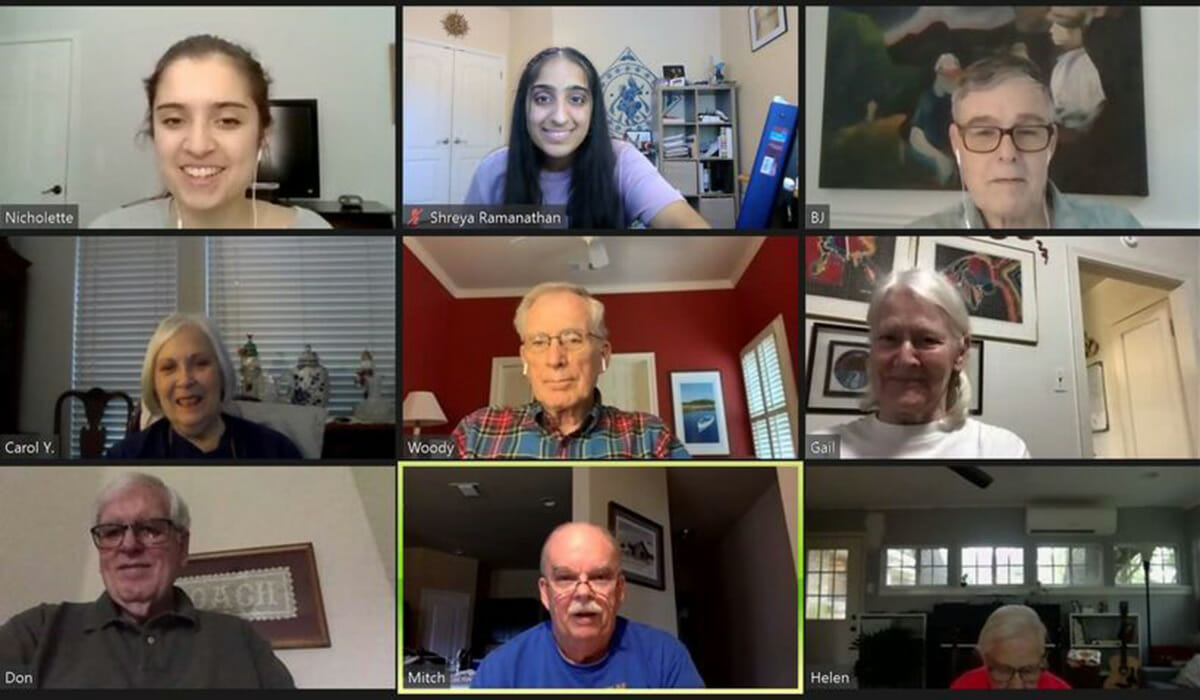Highschool Senior Uplifts Texas Community through the Power of Music

Meet Daily Point of Light Award honoree Shreya Ramanathan. Read her story and nominate an outstanding volunteer or family as a Daily Point of Light.
Although the COVID-19 pandemic resulted in the physical separation of people, Shreya Ramanathan brought together hundreds of Texans through music and volunteerism. The Liberal Arts and Science Academy High School senior created Notes of Change, an Austin, Texas, based organization, in 2018 to spread joy throughout her community with creative performances and concerts.
Ramanathan’s Notes of Change connects local musicians and artists to elderly populations at retirement homes, hospital patients and the broader Central Texas population with in-person and virtual performances. As a lifelong musician herself, Ramanathan understands the impact that music can have on someone’s life, and has made it her mission to bring musical equity to lower income communities and restore memory loss through music.
Describe Notes of Change and the inspiration behind creating it:
I started Notes of Change in 2018 because I’ve been a musician and artist my whole life. Whenever I perform for people, I always see how everyone seems to enjoy it and always makes everyone’s day better — including mine. What I realized is that people in retirement homes, nursing homes and the elderly population have less access to these kinds of artistic performances and activities. They don’t have as much of a creative outlet as the rest of us might have, so I wanted to kind of bring music and art to these communities who might not have as much access to art.
I’m also really into science and medicine. I’ve read tons of articles and research papers and realized how music actually helps improve and maintain your memories and helps prevent memory loss. Based on what I know about music and my passion for music, I decided to start Notes of Change so that I could bring music to the elderly population and help them with their memory loss issues and to support those communities.

Did Notes of Change shift during the COVID-19 pandemic?
When the pandemic first hit, I was really unsure on how we could continue working with the retirement homes and nursing homes, especially because most of those places have pretty limited access to technology for virtual performances. However, I partnered with a few organizations like Heart & Soul Care, AGE and Big & Mini of Texas so that we could basically continue playing for these memory loss support groups virtually, which is really important during the pandemic. I think the elderly were the most impacted at first because they couldn’t go out at all and they were pretty much isolated to their own room. The one thing about memory loss is that isolation only makes it worse. So for me, it was not only important to continue bringing music to these communities to support their memory health, it was also important to bring music and interaction to these communities for their mental health so that they could still continue feeling like there was someone out there who cared about them and there are people out there looking out for them.
Has music always been a part of your life?
I’ve been a musician and an artist my whole life. I started playing the piano when I was five years old and then I started playing the oboe at age 11, which is like my primary instrument now. I also do Indian classical dance, which is also a form of art. So art and music has been such an integral part of my life since I was really, really young. It’s a creative outlet for me and it’s what I go to every time I’m feeling down or when I just need to relax or unwind. Music has definitely been my go-to thing as well as all artistic outlets such as dance.
Describe Notes of Change’s Sounds of Light Project:
One of the things that we did at the beginning of the pandemic was called the Sounds of Light project, which was basically a short series where we got a few highschool musicians to play and we broadcasted the performances on YouTube for all of the retirement homes that we worked with. Even though we weren’t able to connect through live performances for a while in the first two or three months of the pandemic, we put out these YouTube performances for our community and we raised a little bit of money for the American Red Cross, which was amazing.
How can people get involved in Notes of Change?
So I started Notes of Change to connect primarily highschool musicians with the elderly community, but now it’s really open to any musician or any artists out there who’s interested in connecting with the elderly community. I mean, a few months ago, we had an Austin musician who’s definitely not a high schooler. He’s a saxophonist and he played for one of our memory loss support groups. Most of our volunteers are highschoolers, just because that’s kind of the age base that I started with, but volunteers don’t even need to be musicians. I’ve done a few performances with dance, and I’ve had a few volunteers who decided to do a dance performance instead of music. I’ve definitely heard a lot of proposals from visual artists and we’re trying to incorporate art classes and acting classes that are beyond just musical performances and those types of things. So it’s definitely not just for young musicians. It’s for anyone with any kind of artistic inclination or anyone who just wants to get involved with the elderly community. A lot of our sessions have just volunteers who talk to the participants and just get the whole thing going and set the mood, and then we have a few volunteers who are actual musicians. So it’s open to anyone really.
What inspires you to volunteer?
I know what music has done for me during hardship, and the best points in my life are often because of music. So for me, volunteering is just about feeling that amazing feeling that I get out of music for everyone else. I think music is such a central part of just living, I think it’s everywhere and I think everyone, regardless of their age or if they have a memory loss disorder, should be able to have access to that. That’s really important to me, and that’s why I started volunteering. In general, volunteering is really important because I just think that I want to make my community a better place, so if that’s through music, volunteering or doing something else like volunteering at the food bank, it’s just constantly important for me to be helping others and doing my part to make my community a better place.
What have you learned through your experience as a volunteer?
It’s taught me how everyone, even if you don’t have a musical background, can really relate and connect through music. When I first started, I was really scared. As someone who’s classically trained, I was scared that I wouldn’t be able to have our music really relate to what other people are doing with their lives. Yet through sessions, I really learned that even classical music and any type of music can relate to everyone and evoke emotions. It’s been a really great way to connect with the elderly populations and with volunteers who I don’t really know that personally. We can all have this shared experience that connects us.
Something else I’ve learned is about the experiences of the people we work with. I think it’s really easy to start seeing people as less, especially when you’re working with memory loss groups or retirement members. But I’ve learned a lot about their experiences and their youth. A lot of these people used to play instruments and be musicians themselves, so hearing their own stories and experience with music is really cool. Hearing them kind of recall their childhood and their youth with art is really amazing because I think it just shows how impactful music can be for memory loss.

Why is it important for others to give back, especially students?
We have the privilege of being able to be involved with the musical community from such a young age. Personally, my band directors and music teachers have always instilled in me that music is not just for yourself — music is to be shared. So for me, I think for young musicians and students, it’s really important that we pay it forward and give back what we were given by our teachers and our directors. Everyone in our music community has taken the time out of their day to teach us music and to give us this beautiful art form. It’s really important that we continue to spread that knowledge and that art, because otherwise, there’s really no point in music if you just keep it to yourself. I think everyone should have access to music and art in general.
What would you want others to learn from your service story?
I think that even if it seems kind of hard to start something, especially during the pandemic or virtually, anything is possible if you just put your mind to it. We started by playing just a few pieces for a really small group of people at one retirement home and received positive feedback which inspired us to grow. It just shows that if you start small, you can really have a really large impact.
Are there any partnerships, programs, or events that you are excited about? School for music and music therapy?
So we’re trying to expand our organization to work with more retirement and nursing home groups across Central Texas and work with more memory loss groups. Another thing that we’re kind of working on right now is actually bringing music to middle school students who live in lower income areas of Austin. There’s many middle schools in Austin that have a severely underfunded music program so we’re in the process of connecting with those band and orchestra directors and actually hosting free private and master classes for those students so they have the opportunity to become better musicians and hopefully continue their music.
In my personal life, I’m going to college at Emory University in Atlanta, so I’m definitely planning on continuing my work with Notes of Change there and hopefully bringing music therapy for memory loss to nursing and retirement homes in Atlanta. I’m excited to connect with the grassroots organizations within and outside of Emory to make an impact on that city’s elderly community.
Do you want to make a difference in your community like Shreya? Find local volunteer opportunities.
